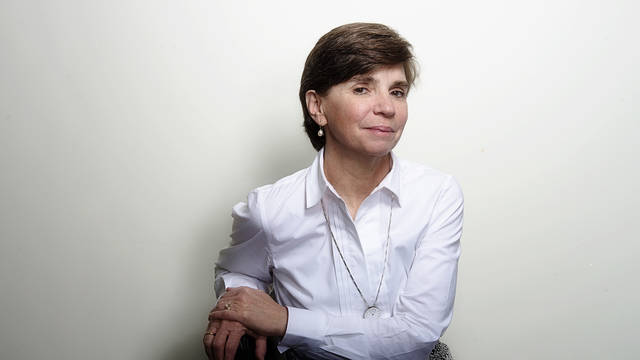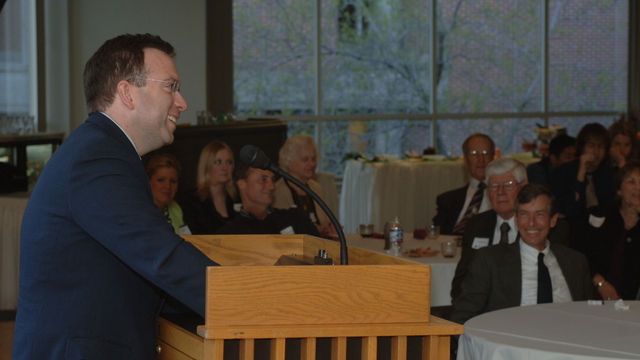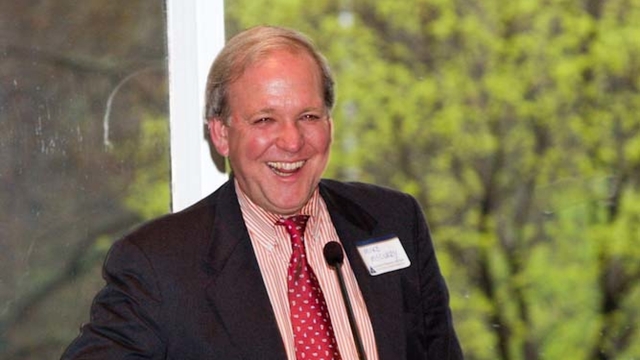While working on The Washington Post’s metro staff, Ifill was tapped by Devroy for the national political staff and covered Bill Clinton’s 1992 presidential race. She later joined The New York Times and spent five years at NBC News covering politics and national trends.
2001 Devroy Forum presentation
Never get introduced by a journalist that knows how to read the clips. Thank you very much, Professor Lippold; thank you, Professor Gordon; thank you, Chancellor Mash. Thank you all for coming out this lovely Eau Claire evening. I had quite a drama getting here today, as some of you may have heard, but I got here because it was important, and I got here because I’m so honored to be here to speak under the rubric of Ann Devroy. Somewhere she’s laughing — laughing at me and saying, 'Who picked her?'
She was really quite amazing. We’ll talk about it some more. I (am) honored to be here, because I snap at the chance to get out of Washington and talk to people who are interested in real journalism. Journalists get such a bad wrap, when in fact so much good work is being done, and when I see the four finalists for the Ann Devroy Fellowship, it gives me hope for the future. It makes me know that we’re really OK. I wouldn’t be here if it were not for my former bosses at The Washington Post, who of course know a thing or two about excellent journalism. When Milton Coleman called me up a year ago and (said), 'Can you go to the Ann Devroy?' I said, 'Yes.' I didn’t get to the Eau Claire part, but I was happy to do this.
Washington was fascinating
It was at The Washington Post where I learned of the demands and the delights of daily journalism at a first-rank newspaper, and that’s also where I got to know Ann. For both of these things, I thank Ben Bradlee and Len Downie and Milton. The Washington Post, as you’ve heard from my incredible 'can’t keep a job' resume, was only one of the steps along the path of my journalism career, but it was one of the most profound steps. Before I go further, I’m going to tell you that I’ll stop soon and take your questions, because I’m always more interested in your questions than my answers. While I was at The Washington Post, I got to cover local politics, courts, cops, elections. I got to cover my first presidential campaign, and that’s how I met Ann Devroy.
I was a lowly national reporter laboring in the far-flung Washington suburbs. No one really cared who I was. The Washington Post was my third newspaper along the way — this is the stuff that doesn’t get into the bio, by the way. My first writing job at the Boston Herald ... was covering food. It was a writing job, and I wanted to write, and I couldn’t cook, but I learned an important thing about food writing and about journalism in general, which is if you don’t know anything about it, you can find out. And I did. I figured I learned how to be a cook too. It was really good. I became an education writer after that while I was in Boston, and ... I discovered another interesting little thing, which is that you can cover a riot by phone. They were paying me so little money that it occurred to me I didn’t really need to go to South Boston, and I had my head whacked off. I could just call and ask how many chairs had been broken that day. I was a city hall and a state house reporter in Baltimore. I was in a wonderful position of covering a city council president who was like a movie; he accepted payments under the table in white envelopes at Italian restaurants with checkered table cloths for sludge contracts. It was very exciting. And I covered a county and city and state government at The Post. I covered Marion Barry before he went to jail, not after. I documented the immense changes that were happening in Washington and in its environment. It was a fascinating place to cut your teeth, but during that time, I only had really a glancing acquaintance with national politics. By the time I met Ann, this was the late 1980s. The Washington Post already had more than a decade under its belt as the best newspaper in the country, the one that drove a president from office, the one that broke Watergate, (and) every quarter a reporter worth her salt wanted to work there. So it was a challenging place to be, it was populated by the best and the brightest. Many of them button-down Ivy League, many of them to the manor born. Then there was Ann. Then there was me. That wasn’t who I was.
I was this preacher's kid who had gone to Simmons College on full scholarship, based on need, I assure you, not academics. From kindergarten through fourth grade, I lived in public housing, something many of my colleagues would know nothing about. I was an anomaly in this newsroom and in most of the newsrooms I entered. I was young, I was black, I was female. I looked like nothing else that was there. Well, in 1987, Ann Devroy was looking for an anomaly. She came to The Post from Gannett, not from Harvard. She came from USA Today, which everyone was still calling McPaper. She was a woman, not a — you should forgive the phrase — preppy white boy, she laughed really loud, and she had really sharp elbows, and you didn’t want to get in her way. And she had a clear idea of what she wanted to do, of what she wanted to add to the Washington Post national staff.
Ann befriended those who overcame odds
Now this is, understand, 1987. When Ann became political editor, she had the best political staff in the country. She had this great team. Men who had covered Watergate, men who had covered political campaigns since the 1960s, men who had covered the White House and the people in it; like, they knew them like the backs of their hands. Men, every last one of them. Ann wanted a woman. She wanted someone who hadn’t covered a bunch of campaigns, she wanted someone who hadn’t covered Congress — someone who hadn’t covered the White House. She knew instinctively that the only thing the award-winning political staff of the Washington Post was missing with someone with a different world view. Now, don’t get me wrong. Ann could outplay the boys any day of the week ... She proved it again and again through out her career. But her best friends were women who like her figured out the game and played it well, excelling no matter the odds. And when it was time to throw a new reporter into the deep end of the pool, covering national politics, she figured the paper would only benefit if someone like that was in the room.
Ann gave me my big break
Ann, there’s no other way to put it, gave me my big break. How big, I certainly didn’t realize at the time, but when she selected from along the pool of candidates who applied for the political job to join the national staff in this plum position, she was very consciously injecting something new into our coverage. I was young, as I keep mentioning because I don’t feel that way anymore. I was perhaps a decade younger than all the other reporters on staff. I was not untested, but I was unseasoned, something she figured she could fix. My job, she told me in that blunt way of hers, was to bring a breath of fresh air to our coverage, a new eye to see things that other folks just couldn’t. I was intimidated, I was scared to death and I was thrilled. I tell you all this not to celebrate the wonder years of my career, and Ann certainly didn’t know that I was going to eventually leave The Post in 1991 and go on to The New York Times or even to make that terrible leap into the dark side of television ... But she did know that there could be value in breathing sincerity into the newspaper industry's lip service to get diversity. She knew I was young, black female, but she would never had bet on me for just those reasons.
What she bet on was that I had the talent and the promise to cut it on the hectic Washington Post national staff. And I knew that if I let her down, that she would come and hunt me down like a dog and beat me up. Failure, as they say, was not an option. Now, how did Ann get those prescient, you might ask? I’d dare say, if she were here today, she would say she was not prescient at all, just operating on gut instinct. Her instinct, I believed, was honed in important ways right here. She was a Midwesterner, not the kind of East Coaster, dandy, who spent years and years hopping from prep school to Harvard to The New York Times. Plus, she saw Washington, and this is important, as entirely accessible. She didn’t see it as the exclusive preserve of senators and ambassadors … and columnists. She saw Washington and she saw politics as a series of questions to be answered. All the old journalism school questions, of course — who, what, why, when, how — but also the questions that often yield the real truth, not just any old answer. Not only how, but how much? Not only who, but who knows who? Not only when, but when will it ever end? Not only why, but why won’t you tell me?
Long after Ann had given up the political editors job to go back to Washington, I would sit next to her in the newsroom — my desk was next to her — and I would listen to the way she grilled sources on the phone. She didn’t let them get away with anything. No bull shit. That was Ann. She wasn’t giving it, and she wouldn’t take it. But there was another thing: She was always laughing, gales of laughter, husky crowing laughter. She might be talking to the vice president, she was hollering with laughter. People told her things because they knew they had to, but they also told her things because they knew that matching wits with her could be so much fun. People ask me why ever do I like politics and why I even like politicians, which is a sickness, I admit. And the answer is because it can be so much fun, and because it can matter and do both of those things. We are professional skeptics in Washington, especially in journalism. We are always prepared to tell you what can’t happen, why it didn’t work last time, why no one is likely to be telling you the truth, and then we sit around in our reporters round tables and ask each other, Why does everyone hate us?
Now, keep in mind that Ann wasn’t one of those reporters you ever saw naval gazing on national television on shows like mine. In fact, she avoided television like the plague. She did Larry King once, was a round-tabled White House journalist, and it was her and me and a couple of other people, and she never did it again. She couldn’t stand it. Meg Greenfield, the late, great Washington Post Editorial Page editor whose words you see in your program tonight, she spoke at Ann’s memorial service that she explained an allergy to television, and she said, 'Never wanted to start on that slippery slope to TV land, because she was afraid that one day she was going to be in a position where she was going to have to say on television, 'thank you, Geraldo.' ' Now, you have to understand everyone laughed just like that that day as well, but at the time, I was squirming, because I was working for NBC. I may have just said that the previous night.
Washington really does matter
To cover politics in Washington, one has to become accustomed to all those little contradictions in your life, because Washington is everybody’s favorite whipping boy. Supposedly America hates politics in general, and it hates Washington politics specifically. And this may be so, but I prefer to believe the results of a poll I came across a couple of years (ago) — you know, one of those polls where they give you answers to questions you didn’t know you had. And this one, 900 people were asked, which place would they most want to visit, if given the chance. The choice was the White House or Graceland. What do you think the answer was? The good news from the point of view of a political junkie is that 66 percent said they would prefer the White House; only 16 percent said Graceland, even though I’m not so sure the numbers would add up the same today. But I have a lot more reasons to be optimistic about what I do and about what we do in this business.
... Washington really does matter, and I say all that having watched a lot of things. I’ve watched Congress locked in perpetual gridlock, believe it or not, though they seem to be getting some things done this year. You may not agree with what they’re getting done, but they’re getting something done. I’ve covered the impeachment and disgrace of the sitting President. I’ve also covered a number of elected officials who preached about morality and family values of the importance of our children, yet have trouble connecting those little facts of their own lives. But there is real debate underway in Washington this year, starting at the White House, encompassing agencies that handle education and the environment and health and human services. Glancing off the capitol and winding up at the Supreme Court, which this year will ruin everything from school prayer to affirmative action to the medical use of marijuana to abortion to, you name it. Now, usually when I give speeches like this, I end up reciting a litany of all the things that they’re not getting done in Washington, but I do believe, and maybe it’s just the advent of the new administration and a new year, that this year is going to be different. It’s already different.
Now, you may not agree what is different about it, but if you feel under taxed, there probably will be tax relief this year. If you feel the political system is corrupted by money, Congress may just do something about it, and the president just may sign it. Russ Feingold in the rose garden, nah. The closest he’ll get. If you think the nation’s public schools aren’t doing enough to properly prepare our children for a higher education, the federal government is at least debating how it can best step up to the plate, talking about standards and testing, not talking about abolishing the Department of Education entirely. Basically, what this new Bush administration has demonstrated is that much of what the pundits had to say last year in the heat of the campaign was just wrong. It does matter who the president is. There was a big difference between Al Gore and George W. Bush. It was never, as my mother use to say, six or one-half dozen of the other. I would love to see how Ann Devroy would have covered the second Bush administration. You know, they call themselves 43, they differentiate themselves from 41, which was dad’s administration. It’s so cute. So Maine, so Yale. But I would have loved have seen how Ann would have held their feet to the fire on our arsenic and drinking water and on the merits of nuclear power, which they’re about to sell us on. The first Bush White House trembled the very sight of her name on a pink phone message slip. I like to think she would have had all this figured out from the first, the ascendancy of George W., the underlying weaknesses that we finally discovered about Al Gore, the spectacular recount and the outcome that none of us predicted. And after it was all over, she would have laughed loud and long, kissed her daughter and her husband in the morning and set out to teach us how it’s done all over again. Maybe I’ll get to be Ann Devroy when I grow up.
Thank you all very much!


